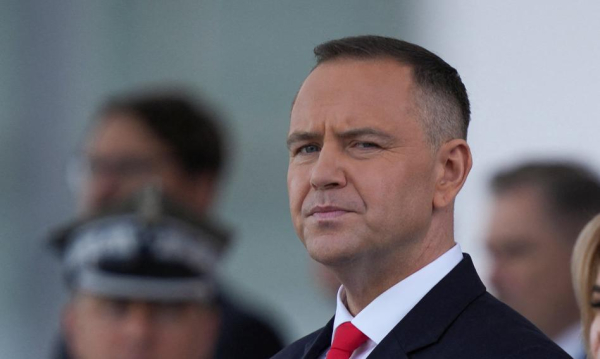President Karol Nawrocki announced on Monday that he has not signed the amendment to the law on assistance to Ukrainian citizens. He justified his decision, among other things, by arguing that the 800+ benefit should only be available to Ukrainians working in Poland.

“The law on assistance to Ukrainian citizens does not make the correction that prompted the public debate. I will not change my mind and believe that the 800+ benefit should only be available to Ukrainians who make the effort to work in Poland, ” the president said at Monday's briefing.
Earlier, during the legislative process, PiS MPs proposed making the payment of the 800+ benefit to Ukrainian citizens conditional on employment or running a business in Poland, and tightening the requirements for obtaining Polish citizenship. Their proposal was rejected.
Nawrocki, explaining the reasons for his decision on Monday, recalled that three and a half years ago, following the Russian Federation's attack on Ukraine, a war broke out that affected the entire security architecture of the world. “After its outbreak, Poles once again proved that we are a nation of great solidarity, a nation of open hearts, beyond political divisions,” he said. He also added that the solutions adopted at the time were ad hoc.
“After 3.5 years, the situation, including in terms of Polish public finances and political and social emotions, has fundamentally changed. The law that was proposed 3.5 years ago should be corrected today, ” he assessed. He added that this has not happened.

Gawkowski: Presidential veto means shutting down Starlink internet in Ukraine
The president knew that the vetoed bill on support for Ukrainian citizens also included issues related to Starlink; with his decision, he effectively shut down the internet in Ukraine, Deputy Prime Minister Krzysztof Gawkowski told PAP. He added that the government would seek alternative solutions, but time was of the essence.
President Karol Nawrocki announced on Monday that he has not signed the amendment to the law on assistance to Ukrainian citizens. He justified his decision, among other things, by arguing that the 800+ benefit should only be available to Ukrainians working in Poland.
Deputy Prime Minister and Minister of Digital Affairs Krzysztof Gawkowski announced that the president's veto means that Starlink satellite internet will be turned off in Ukraine.
“Support for Ukraine in ensuring connectivity, which expires at the end of September, was supposed to be extended. We wanted to continue financing satellite internet for Ukraine. Unfortunately, the president's disastrous decision complicates this significantly, and we will have to notify our partners that such support will now expire at the end of September,” Gawkowski told PAP. He assessed that the president was fully aware that the vetoed bill on support for Ukrainian citizens also included issues related to Starlink. He noted that he was surprised the president made such a decision.
According to Gawkowski, the president took “a very high risk” and by deciding to veto the bill, “he de facto turned off the internet in Ukraine”, “he turned it off in schools, he turned it off in hospitals”.
“The president's decision clearly means that there will be no internet, nor support for the tax administration in Ukraine. (…) Today, the president must take responsibility for this and say whether this is called a true partnership with Ukraine, which is at the end of peace negotiations and which is now being stabbed in the back,” he said.
The Deputy Prime Minister also stated that the government “will, of course, seek other solutions” to support Ukraine. Asked whether the government would prepare a separate bill to extend the operation of the Assistance Fund for Ukrainian Citizens, he pointed out that time is of the essence. “We have begun consultations within the government, but it's difficult to say at this point what that will look like.”
He informed that issues such as when Ukraine will lose the internet provided by Poland and how we can negotiate with the Starlink service provider will be subject to final review.
– All security issues are discussed during the Council of Ministers and such information will certainly be provided during the Council of Ministers meeting – he said when asked whether the issue of Starlink internet for Ukraine would be discussed at Tuesday’s government meeting.
Gawkowski also addressed the matter on portal X. “I can't imagine a better gift for Putin's forces than cutting off Ukraine's internet, which the President has just decided. Mr. President, you must stop blindly attacking the government in the name of political fighting. You are harming people who are fighting for their independence and at the same time helping Russia,” Gawkowski wrote on Monday. He added that this means not the end of Starlink internet, which Poland provides to war-torn Ukraine, but also “the end of support for storing the Ukrainian administration's data in a safe place.”
As the Ministry of Digital Affairs informed PAP, the task “Ensuring connectivity on the territory of Ukraine for citizens of this country”, consisting in providing Ukraine with Starlink satellite communication system terminals and financing their subscriptions, is carried out on the basis of the Act of March 12, 2022 on assistance to citizens of Ukraine in connection with the armed conflict on the territory of that country.
Article 14 of this Act indicates that an Aid Fund is established at the National Economy Bank “in order to finance or co-finance the implementation of tasks to assist Ukraine, in particular citizens of Ukraine affected by the armed conflict on the territory of Ukraine, including tasks carried out on the territory of the Republic of Poland and outside it, as well as the implementation of tasks related to the country's food security in connection with the armed conflict on the territory of Ukraine.”
The Ministry noted that the president's veto to the amendment to the act means there will be no legal basis or funds for further implementation of the task in question after September 30, 2025.
He also emphasized that the situation is similar with healthcare. “If we look at healthcare and see a certain preference shown by Ukrainians over Poles, and the healthcare coverage that Ukrainians are entitled to regardless of whether they work and pay health insurance contributions, this puts us in a situation where Polish citizens in their own country, Poland, are treated worse than our guests from Ukraine. I also disagree with this,” he emphasized.
The president announced his own legislative initiative. ” My bill proposes new rules for granting citizenship, including to visitors from countries other than Ukraine . I believe this process should be extended. The bill will also include tougher penalties for illegal border crossings. To eliminate Russian propaganda and base our relations with Ukraine on mutual respect, I believe we should also include in the bill the clear slogan 'stop Banderism,'” he said.
According to his proposal, the Bandera symbol would be equated with symbols that – as he said – correspond to German National Socialism, commonly called Nazism, and Soviet communism, and corrections would be made to the Act on the Institute of National Remembrance – Commission for the Prosecution of Crimes against the Polish Nation in relation to the crimes of the OUN-UPA.
He added that these solutions are in the interest of the Polish national community and good relations with Ukraine, which should be built on the foundation of justice, truth and against Russian propaganda.
Nawrocki announced that the presidential project assumes that the process of granting citizenship will be extended from three to 10 years and that the penalty for illegal border crossing will be increased to 5 years of imprisonment.
The head of the president's office, Paweł Szefernaker, reminded the public at a later briefing that the current statutory solutions regarding assistance to Ukrainians are in force until the end of September.
We appeal for this bill to be passed by the Polish parliament by the end of September. If it is passed in the form we have prepared, the president will be able to sign it immediately. We want to cooperate, we want to talk beyond divisions, so that this bill reaches the president by the end of September (…),” said Szefernaker.
The amendment to the law on assistance to Ukrainian citizens in connection with the armed conflict on the territory of that country assumed the extension of temporary protection granted to Ukrainian citizens fleeing the war until 4 March 2026. The change results from the implementing decision of the EU Council of 25 June 2024.
The amendment was also intended to clarify the conditions for receiving the 800+ benefit , so that it would also be paid to children who completed upper secondary school before the age of 18 and fulfilled the obligation to study by attending a university or vocational qualification courses.
The head of the Ministry of Family, Labor and Social Policy on the 800+ program: You cannot punish people for losing their jobs, especially innocent children.
In a post on the X portal, Agnieszka Dziemianowicz-Bąk, Minister of Family, Labor, and Social Policy, pointed out that “800 plus is money for and for children.” “Children who are not responsible for whether their mother has a job, has just lost it, or is caring for a sick grandmother or a newborn. Work should be valued. After losing a job, people should be encouraged and helped to find a new one. But job loss should not be punished—especially innocent children,” emphasized the head of the Ministry of Family, Labor, and Social Policy.
“It's the ABC of human decency. It's a shame the president lacked it,” she added.
The period for voivodes to settle matters such as granting a temporary residence permit, granting a permanent residence permit, granting a long-term resident's European Union residence permit, changing a temporary residence and work permit, changing a temporary residence permit for the purpose of performing work in a profession requiring high qualifications, and withdrawing temporary residence permits, permanent residence permits and long-term resident's European Union residence permits from foreigners was also to be extended.
Additionally, it envisaged measures to tighten the assistance system. This included excluding the possibility of granting privileges to Ukrainian citizens who cross the border for short periods under a local border traffic permit.
It also aimed to repeal, among other things, provisions allowing revenue from fees related to the sale of alcoholic beverages to be allocated to aid Ukrainian citizens. It also introduced the requirement to confirm family ties between a third-country national and a Ukrainian citizen with appropriate documentation – civil status documents or other documents issued by the competent authorities.
According to the amendment, support for local government units was to be continued in the implementation of additional educational tasks related to the education, upbringing and care of children and students who are citizens of Ukraine.
The amendment was to introduce changes to the Act on the Professions of Physician and Dentist and the Act on the Professions of Nurse and Midwife, aimed at tightening the so-called simplified system, enabling the practice of the professions of physician and dentist by Ukrainian citizens and other persons who obtained qualifications outside the European Union.
Without signature also the amendment of the Fiscal Penal Code
President Karol Nawrocki vetoed the amendment to the Fiscal Penal Code and the Tax Ordinance, reducing penalties for formal fiscal offences.
– I do not agree to lowering penalties for financial crimes in the dramatic situation of Polish public finances – said President Karol Nawrocki at a press conference on Monday.
The amendment to both laws, part of the government's deregulation package, aimed to reduce penalties for tax offenses that do not result in direct tax losses. The new limits on court-imposed fines were to be 480 daily rates (PLN 29,862,336) instead of 720 daily rates (PLN 44,793,504) or 120 daily rates (PLN 7,465,584) instead of 240 daily rates (PLN 14,931,168).
In addition, the bill was intended to eliminate the obligation for tax remitters/collectors to report the individuals responsible for calculating, collecting, and paying taxes. The vetoed bill also intended to eliminate the penalty for violating the obligation to designate a tax collector.
There are also signatures
President Karol Nawrocki announced on Monday that he had signed an amendment to the Banking Law allowing for the rapid closure of so-called “dormant accounts” and a law on the storage of natural fertilizers. At the same time, he vetoed provisions reducing penalties for formal tax offenses.
The first of these acts is an amendment to the Banking Law, introducing a legal basis for the implementation of the obligation for banks and cooperative savings and credit unions to obtain information on the date of death of customers directly from the PESEL register, which will enable the quick closure of so-called “dormant accounts” (related to the lack of activity on the part of the account holder).
As the president stated during a press conference on Monday, it gives heirs the opportunity to “manage more efficiently during this tragic situation and activate dormant deposits.” “This is one of the laws in the entire deregulation package and it should be beneficial; in my deepest belief, it will be beneficial precisely for people who currently have problems with dormant deposits,” Nawrocki noted.
The second of the signed acts extends the deadlines for adapting places for storing natural fertilizers, which farms that breed or raise farm animals are obliged to do.
Nawrocki pointed out that there had been “some controversy” surrounding this bill, but “it did not tip the scales after consultation with agricultural groups.” “I decided that this bill could be signed with the good of Poland,” he added.
Pursuant to the Act on special solutions for the storage of natural fertilizers, smaller farms with up to 20 livestock units (LU) will have their deadline extended until the end of 2027, while larger farms, keeping more than 20 but not more than 210 livestock units – until the end of 2025.
The law will also allow for more efficient construction of natural fertilizer storage facilities and increase water protection against nitrate pollution from agricultural sources. By the end of 2027, obtaining a zoning permit for manure storage areas or slurry and liquid manure tanks will no longer be required.
Changes to the teacher's card. Black Friday hours are ending.
President Karol Nawrocki announced on Monday that he has signed two more bills amending the Teachers' Charter. One eliminates so-called blackout hours as of September 1st. The other concerns the employment of specialist teachers in private schools and institutions: pedagogues, psychologists, and speech therapists.
Nawrocki announced at a press conference that among the bills signed on Monday were two concerning the Teachers' Charter. This means that the president has signed all the amendments to the Teachers' Charter that parliament has recently considered.
As Nawrocki said, “although there are some comments regarding these acts,” he considered that “in connection with the upcoming school year, at this level of detailed solutions, it is worth signing all three acts relating to the Teacher's Charter today so that our children can start the school year – leaving the details for further discussions.”
Nawrocki added that one of the bills he signed gives the entire parliamentary majority and the president time to “consider certain detailed solutions.”
This is a temporary solution included in the amendment to the Teachers' Charter, i.e., until August 31, 2027 – after which it will be evaluated. The amendment provides that in non-public schools and institutions, tasks related to psychological and pedagogical support will be entrusted to specialist teachers (e.g., educators, psychologists, and speech therapists) for no more than 9 hours per week (instead of 4 hours as before), on a basis other than an employment contract, including a contract of mandate or a B2B contract (a contract with a sole proprietorship).
The new regulations are also intended to enable the hours spent performing tasks by these specialist teachers to be counted towards the employment standards specified in the Act.
The second amendment signed on Monday eliminates teacher availability hours, known as blackout hours, effective September 1, 2025. This is one hour per week during which, as part of a 40-hour workweek, teachers are obligated to be “available at school” to “conduct consultations for students or pupils or their parents as needed.”
The solution, effective from September 1, 2022, owes its name to the then Minister of Education and Science, Przemysław Czarnek, who introduced it.
From the outset, trade unions, including the Polish Teachers' Union, opposed the regulations. In May of this year, in a letter to Education Minister Barbara Nowacka, the union pointed out that after three years of implementing the regulations, teachers emphasized that it was “a dead letter because the hours of availability have not facilitated contact between the school and parents; parents and students do not benefit from this solution.”
The union also conducted a survey among nearly 12,500 teachers. The vast majority (96%) of them believed that the open hours should be eliminated. Two percent of teachers disagreed (another 2% believed the regulations should be modified). When asked “How often do your students use the open hours?” three-quarters of respondents (75%) responded “no” (16% of teachers indicated that students do so very rarely, 6% rarely, and 3% often). The majority (79%) of teachers also indicated that students' parents do not use the open hours (18% indicated that they do so very rarely, 3% rarely).
According to the vast majority (97%) of respondents, the availability hours did not facilitate contact between the school and parents, and more than half (55%) of teachers assessed that their workplace did not provide conditions for implementing availability hours (a separate room).
The draft regulations – part of the deregulation package – were prepared by the Ministry of National Education. In preparing the changes, the ministry argued that the proposed solutions introduce greater flexibility in organizing teachers' working hours, facilitate consultations, and improve contact with students and parents. Furthermore, they are “expected by the educational community.”
mchom/ kkr/ kno/ sza/ agz/ mhr/






